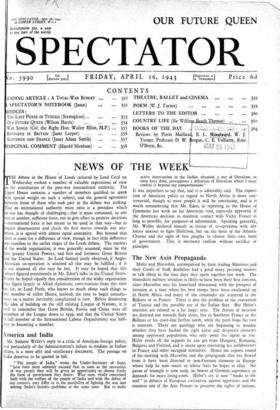America and India
Mr. Sumner Welles's reply to a critic of American foreign policy, and particularly of the Administration's failure to mediate irr Indian affairs, is a most able and satisfactory document. The passage on India deserves to be quoted in full.
" The people of India," wrote the Under-Secretary of State, "have been most solemnly assured that as soon as the necessities of war permit they will be given an opportunity to choose freely the form of government they desire. Wise men, vitally concerned both with the welfare of the people of India and with the defeat of our enemies, may differ as to the possibility of fighting the war and solving India's historic problems at the same time. But to make
active intervention in the Indian situation a test of liberalism, as some have done, presupposes a definition of liberalism which I must confess is beyond my comprehension."
It was important to say that, and it is admirably said. The exposi- tion of American policy in regard to North Africa is more con- troversial, though to most people it will be convincing, and it is worth remembering that Mr. Eden, in reporting to the House of Commons last week on his American visit, expressly approved of the American decision to maintain contact with Vichy France as long as possible, for purposesk of information. Speaking generally, Mr. Welles declared himself in favour of co-operation with any forces anxious to fight Hitlerism, but on the basis of the Atlantic Charter and the right of free peoples to choose their own form of government. This is necessary realism without sacrifice of principle.


























